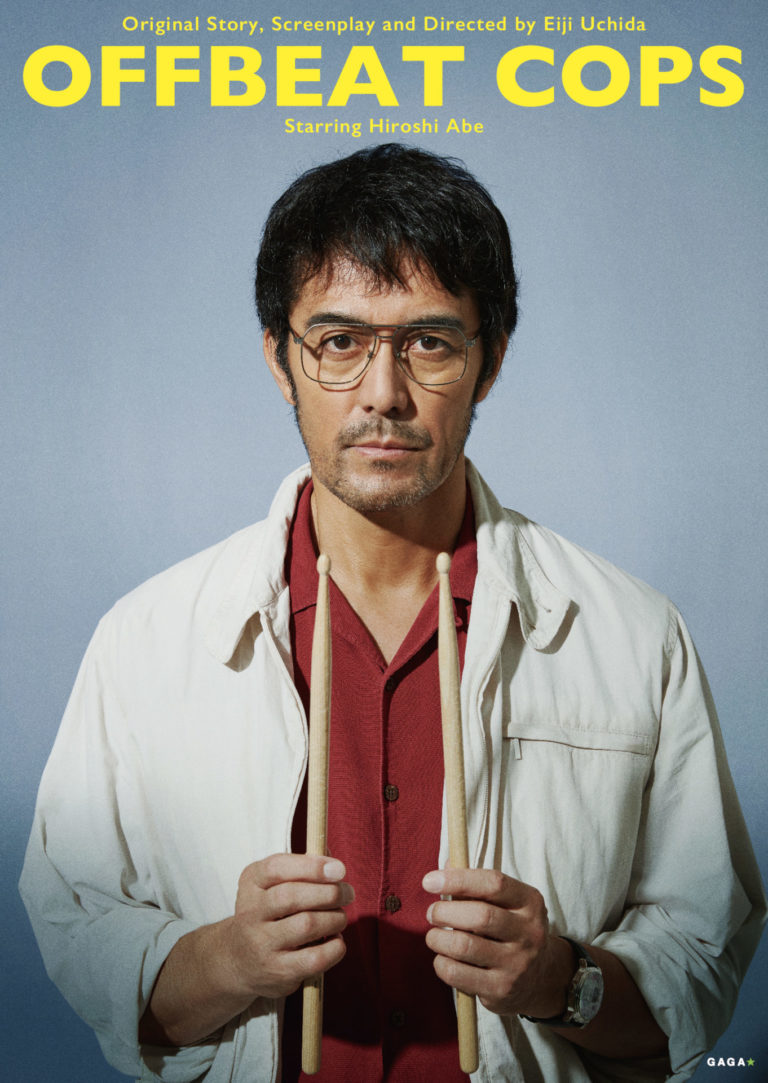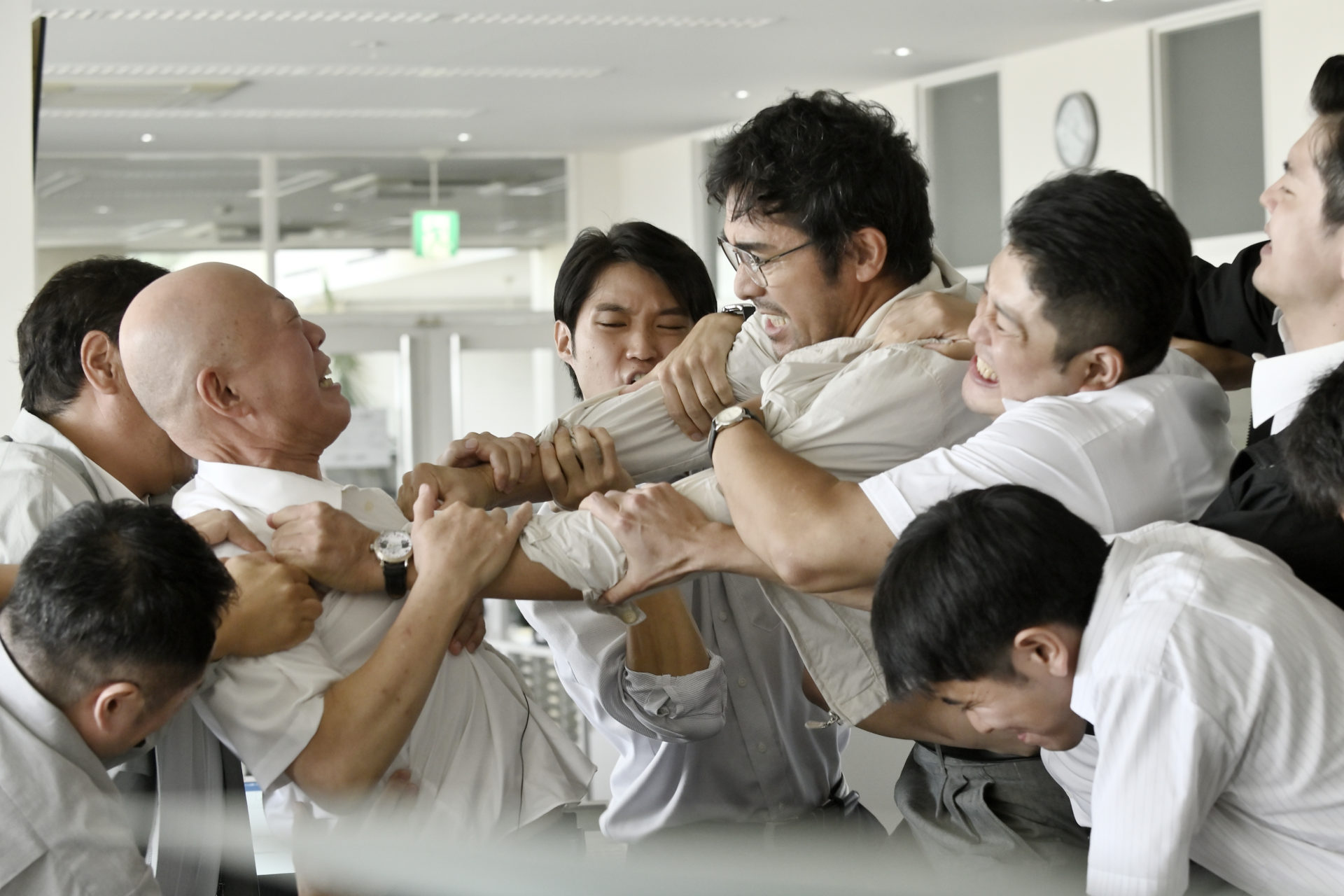
The Japanese film Offbeat Cops, part of the 2022 New York Asian Film Festival line-up, presents a feel-good story about making amends, written and directed by Eiji Uchida.
The film begins and ends with the mystery and solution of the “pre-called burglaries” case. It involves a small gang that phones elderly women and deceitfully gains information about where they hide their savings, to then then show up at their homes and rob them. The very first scene opens with a telephone conversation portraying the first victim through a cinematic angle that seems to pay homage to the famous tatami shots by Yasujirō Ozu — with the camera placed at a low height, supposedly at the eye level of a person kneeling on a Japanese mat.
The main character is Tsukasa Naruse (Hiroshi Abe), who works as a detective and is extremely passionate about his job, to the extent that he doesn’t always follow the rules in order to catch criminals. Due to this, Tsukasa gets transferred to the police musical band and thus embarks upon the most challenging personal mission he ever confronted in his thirty-year career as a policeman.

The screenwriter-director saw a flash mob video of a police band on YouTube, that inspired him to portray the parable of a middle-age crisis that is overcome through the power of melodic acoustics. As many films have done before, music serves as the greatest educator for an existential awakening. The moments in which the band practices, that show the progression of the music ensemble, are enjoyably amusing. Equally delightful are the formation routines that are rehearsed by the musicians and flag twirlers in a sports field. The music selection throughout Offbeat Cops is very captivating, since we listen to familiar pieces such as Oh When The Saints Go Marching In, Land Of Hope And Glory, Radetzky’s March and In The Mood.
Offbeat Cops shows how it’s not necessarily important to play by the rules, but to do the right thing. In fact, the ultimate message is about human justice, rather than the one imposed by the law, as the catchphrase that keeps emerging in the film recites “not all emergencies fit the rules.” This reverberates in the witty title that has a dual significance: the police band at the beginning plays out of rhythm and its members turn out to be unconventional officers of the law.

The film blends elements of Western dramedies that use music and police service personnel as stories of transformation. Offbeat Cops echoes the themes of motion pictures like Police Academy and Sister Act by depicting the metamorphosis of the protagonist as he confronts a new environment, which helps him acknowledge the importance of being apologetic.
At times the narrative and character construction in Offbeat Cops is a little too formulaic: we begin with the cantankerous anti-hero who rather quickly recognises his insufferable behaviour and becomes a glorified soul. He switches from uptight to collected. He initially bursts into violent fits of rage and ultimately expresses regretful acknowledgements of his offences. During his emotional journey many elements are keen to underline how Naruse is an insensitive man, who eventually acquires the sympathy he was lacking. He has no patience with his mother Sachiko (Mitsuko Baishô), who suffers from dementia, he forgets about the school concert of his daughter Noriko (Ai Mikami) and has no empathy towards his band members starting from trumpet-player Haruko Kurushima (Nana Seino). The latter is a divorcee, like Naruse, and raises as a single-mother her little boy Ren.
Her composed approach to family difficulties, as much as her frankness in criticising Naruse’s unsympathetic attitudes, contribute to the melt down and spiritual growth of the iron-handed cop.
The conventional fairytale structure conducts Naruse to overcome his previous state of mind, to flourish into a more caring and understanding man.
Trumpets and drum rolls lead the way throughout a gentle tale of self-realisation and teamwork. Filmmaker Uchiko surely knows how to pull on the right strings to create this buoyant atmosphere. The charming trait is the parallelism between a music band and the police unit: they both need to work in unison to achieve harmony and there will always be someone who will cover up for another person’s mistakes. It’s all about preparation, but also being able to improvise when needed; it’s all about the jam session of life.
Final Grade: B-
Check out more of Chiara’s articles.
All Images ©2022 “Offbeat Cops” Film Partners

